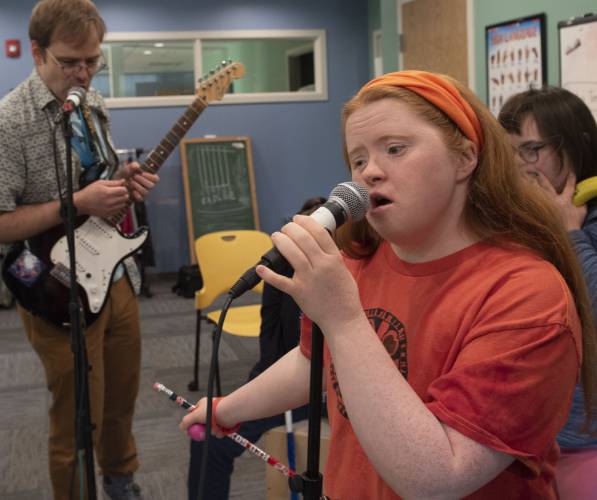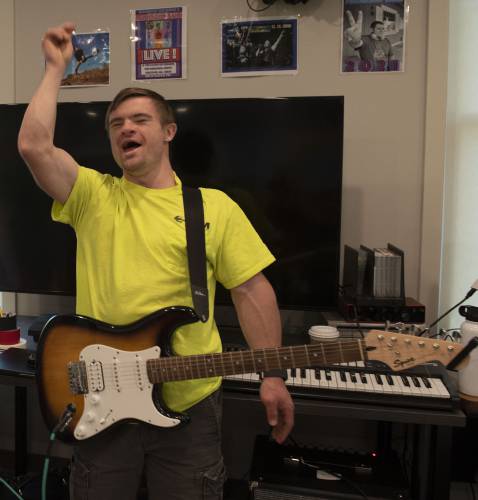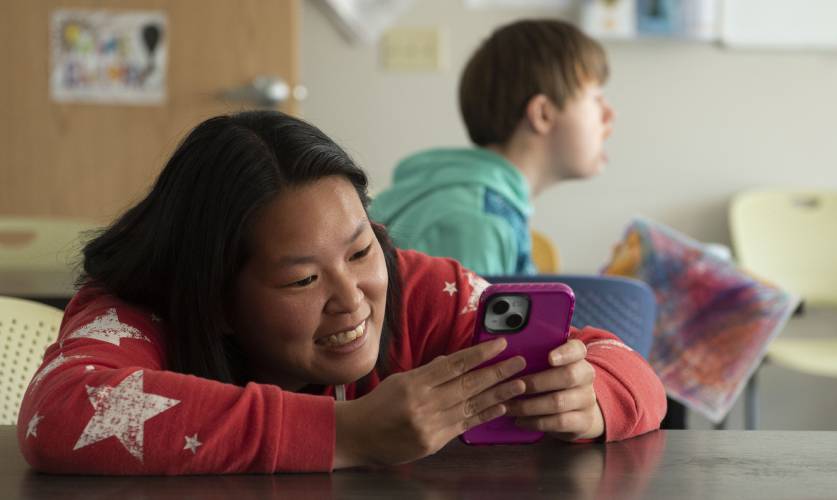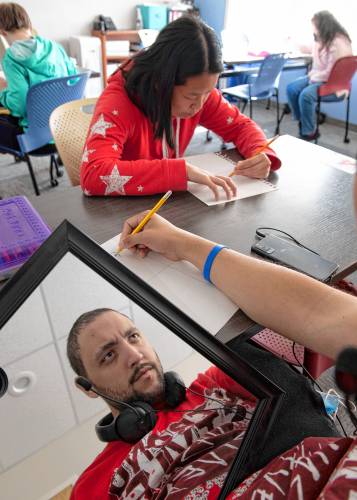By CAROLYN BROWN
Staff Writer

Lucie Pasche, one of the lead singers in the Friendship Band, with Brian Melanson, a longtime teacher and band member, during a rehearsal for The Bash, a 20th anniversary celebration of Whole Children. STAFF PHOTO/CAROL LOLLIS
The Northampton organization Whole Children, which serves people with intellectual and developmental disabilities, will celebrate its 20th anniversary with indie rock band Yo La Tengo at 33 Hawley on Wednesday, Oct. 23, at 6:30 p.m.
At the event, called “The Bash,” Yo La Tengo will play with the Friendship Band, a musical group whose members are students at Whole Children and Milestones, the organization’s adults-only program. Each group will play a set of their own music, and they’ll combine to play each other’s songs as well.
Whole Children was founded by a group of local parents who wanted to create social and educational opportunities for their children with intellectual and developmental disabilities. As the kids grew up, however, they needed more age-appropriate activities and programming — lessons on dating and relationships, for example — so the parents founded Milestones. In 2010, the organization merged with Pathlight, another local organization for people with disabilities.
Milestones offers activities based on participant interest, and a number of students wanted to be in a band — which Valle Dwight, director of development and communications, attributes to the popularity of boy bands at the time — so the Friendship Band was born.
Its members (including staff) range in age from 24 to 52, and their work includes performing gigs in the community. In August, the group played a tribute act as Joan Jett & the Blackhearts as part of LookStock, a music festival in Look Park.
Whole Children and Milestones director Chris Harper, who also drums with the Friendship Band, said, “We’re having a lot of fun here — not just the students, [but also] the staff, all of us in the band, in theater, in all of our classes. I always feel like, if people can see what we’re doing, they’ll want to be here.”

Garrett Wheeler, a member of the Friendship Band, sings the chorus to one of the group’s original songs during a rehearsal for The Bash, a concert to celebrate the 20th anniversary of Whole Children. STAFF PHOTO/CAROL LOLLIS
Being in a band, she said, is a particularly great opportunity for people with intellectual disabilities to develop social skills, not only because music itself is so universal, but also because it requires so much active listening and cooperation. Dwight agreed: “A rock band gives you more leeway to be expressive without having to be perfect.”
Staff members hope that The Bash will not only inspire future potential band members to join, but also that the audience will take away the value of inclusion.
“We don’t want people to be like, ‘Oh, that band’s pretty good for a band of people with disabilities,’” Harper said. “We want them to be like, ‘Oh, that band’s really good, that was really fun — period.”
At a rehearsal on Tuesday, about a dozen members of the Friendship Band, including three staff members, gathered in a studio space at Pathlight to rehearse for The Bash. Several were wearing Friendship Band t-shirts in various colors. The big show was eight days away, and tickets were already sold out.
Leading the rehearsal that day was Brian Melanson, who’s been a part of Whole Children for 15 years. Though his main role at the organization is teaching relationships and sexuality through the program’s “Whole Selves” curriculum, he said that the Friendship Band is his favorite part of his job. Besides singing and playing guitar, his job during the rehearsal was to keep things flowing and the energy high.
“That was siiiiiick!” Melanson said as the group finished “Good Idea,” one of their original songs about the power of friendship. “Singers are gettin’ it done! More, Lucie!” he said, encouraging a vocalist with Down Syndrome to be louder on the mic.
Besides teaching music, the Friendship Band staff members are also responsible for making sure that the group is accessible to members of all abilities, both in practical terms (for example, tuning guitars differently to accommodate members who have low finger strength) and in the group’s culture. Near the beginning of the rehearsal, Melanson reminded the group not to be bothered if AJ, a blind keyboardist and vocalist with echolalia, repeated what they said, because he wasn’t making fun of them: “That’s just how he processes information.” The group works from the notion that everyone can participate and succeed with the right accommodations — as Melanson put it, “We don’t know what people can’t do, so we just do stuff.”
As the group worked through their rehearsal set list, they played a few original songs, including the Friendship Band theme song and “Friendship Band Blues”:
Friends are the best, there is no doubt / Friendship is what it’s all about / When you are down, they give a hand / Especially in the Friendship Band!
Another original song on the day’s set list was “Bobotia,” which got its name from a Milestones member who mispronounced “bon appetit” while filming a commercial for a cooking class. The word stuck. Now, Melanson said, the group uses it to refer to “something amazing and perfect and wonderful. The best cup of coffee is bobotia. The best riff is bobotia.”
As they played, Melanson walked around with the mic, asking a few performers to name something that they considered bobotia. One reply: “Birthday parties!” Another: “My name is Sari!” (It was a joke — Sari is a different band member.) Another: “I love Friendship Band!”

Grace Smith uses her phone to communicate an answer to a question her teacher asked during an art portfolio class offered as part of Milestones, which grew out of Whole Children. In the background is Christina Kiely. STAFF PHOTO/CAROL LOLLIS
A number of staff members said it’s common for Whole Children and Milestones students and/or their parents to assume that they wouldn’t be able to perform on a stage. Over and over, though, the students prove those assumptions wrong, becoming more confident and flourishing (while building friendships) onstage and off.
Sydney Meininger, who plays drums and tambourine and sometimes sings in the Friendship Band, said that before she joined, she had always wanted to be in a band with other people with disabilities, and doing so with the Friendship Band had helped her “find my place in being able to play an instrument.”
Of course, positive change can look different for some members. Melanson pointed out Aidan O’Donoghue, a band member with Down Syndrome who sang and played maracas during rehearsal. O’Donoghue, who’s also part of the Joyful Chorus at Whole Children, is someone who, Melanson said, “would hop on a stage at any time, day or night, and would kill it.”
“But to watch him control his energy and dance when it’s time to dance, sing when it’s time to sing, connect with audiences, and speak clearly — that stuff is mind-blowing,” Melanson said.
O’Donoghue agreed that the Friendship Band is a “good opportunity” for him, and he appreciates that singing with the band allows group members to express themselves.
Dwight said that the initial plan for The Bash was just to feature a local act, but the organization decided to dream bigger. They thought of Yo La Tengo, a popular indie rock band that’s been around since 1984, has 17 albums, and has performed at venues around the world. (They also guest-starred in the “Parks and Recreation” episode “Moving Up: Part 2” as the fictional group “Bobby Knight Ranger.”) When the band accepted the invitation, they were surprised and delighted.

Mikey Acevedo works on a self portrait in an art portfolio class offered as part of Milestones, Whole Children’s adults-only program. In the background is Grace Smith. STAFF PHOTO/CAROL LOLLIS
“It’s a good lesson — you never know,” Dwight said. “Throw it out in the universe, and somebody might say yes!”
As The Bash approaches, there’s still a bit of rehearsal work left to go, but the Friendship Band’s non-musical work — building connections and fostering personal growth — is continuous. As Melanson put it: “We’ve just begun, dude!”
Carolyn Brown can be reached at cbrown@gazettenet.com.


